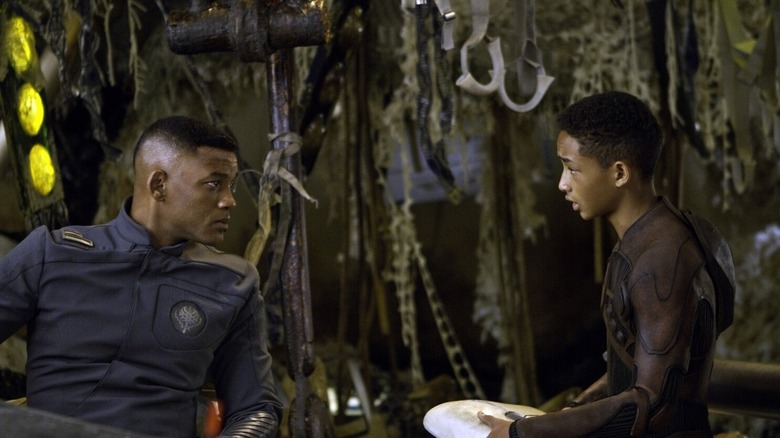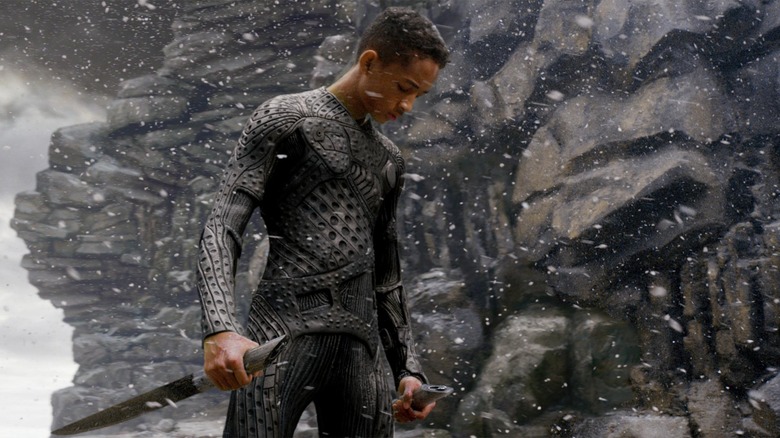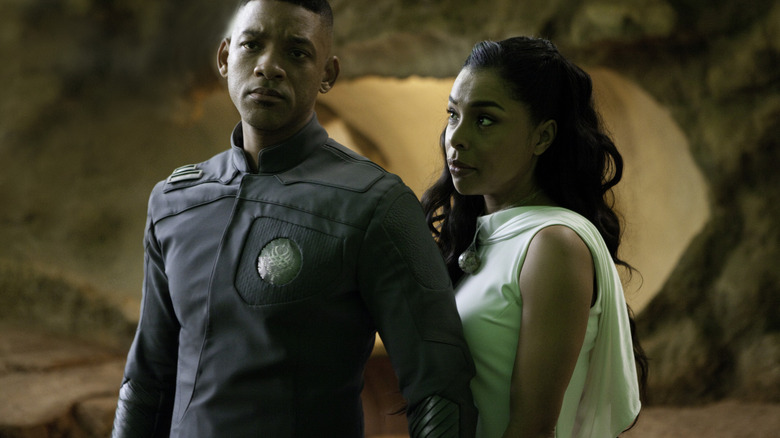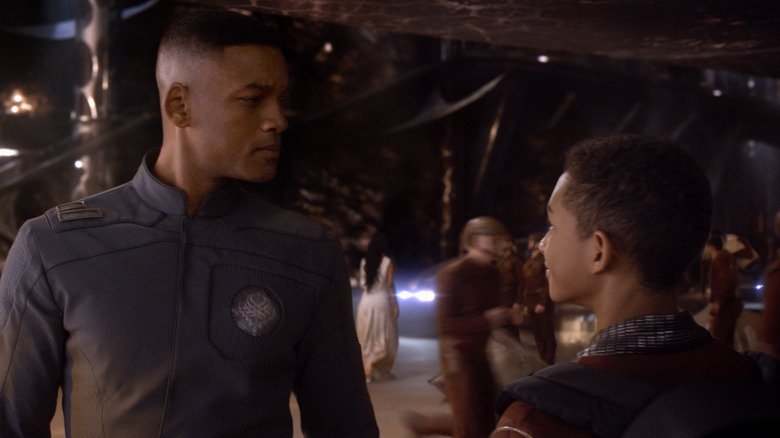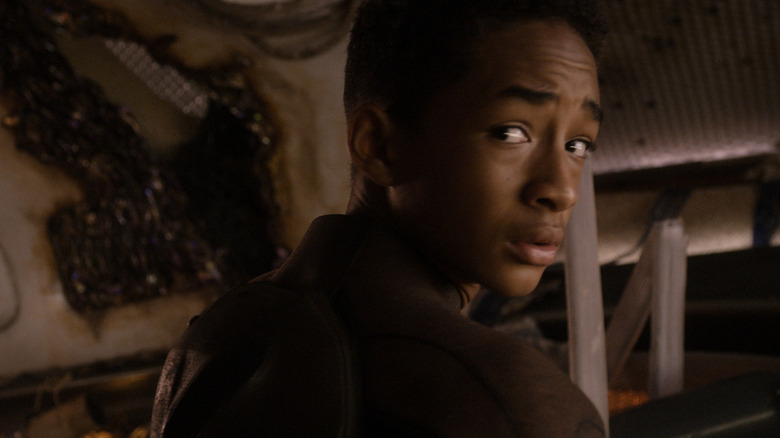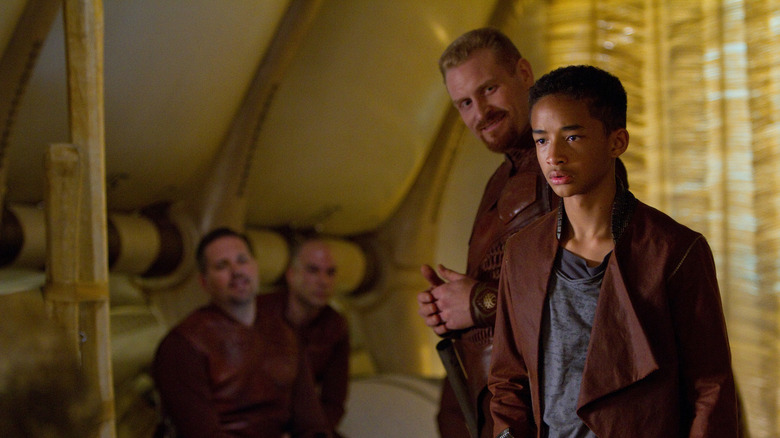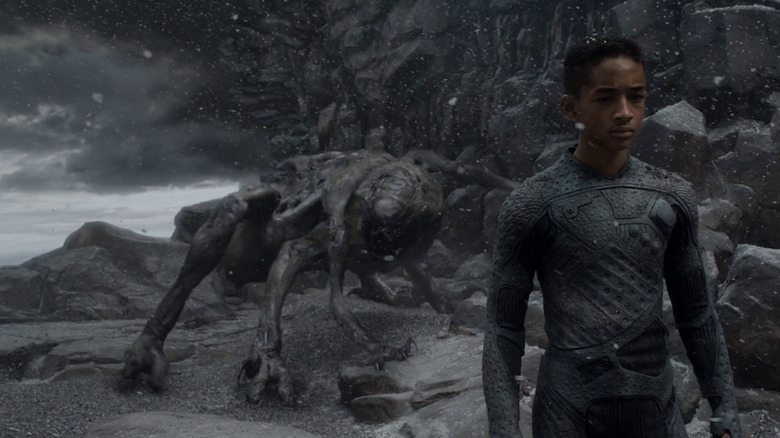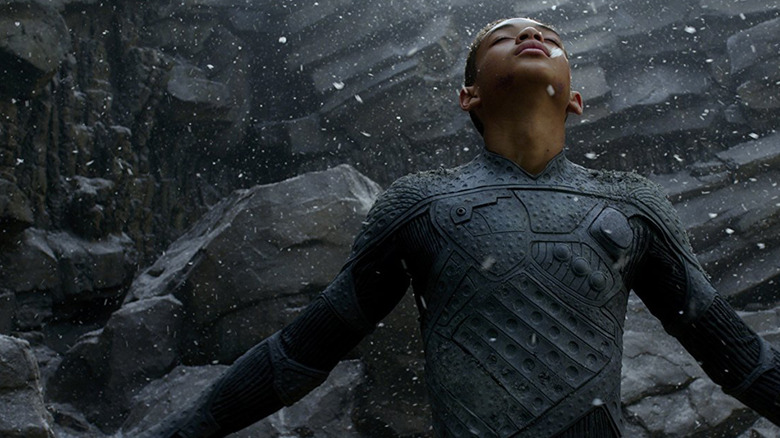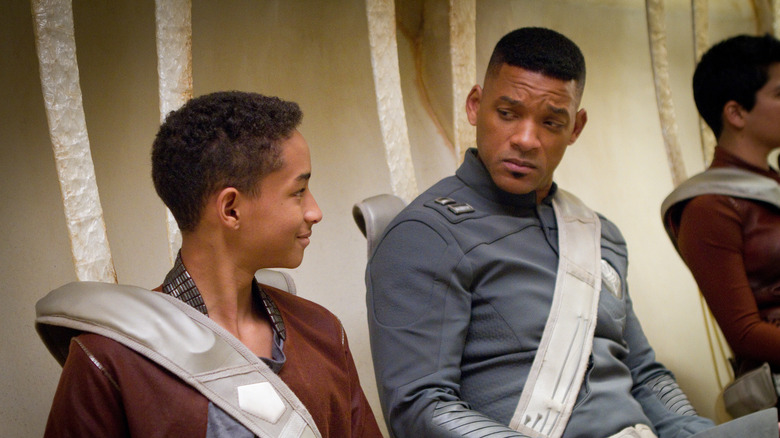Why Will And Jaden Smith's After Earth Bombed
Less than two years after its release, Will Smith described his 2013 blockbuster "After Earth" as his "most personal failure." It was a shocking statement coming from a man who's famous for putting a happy face on things, but it wasn't inaccurate. On every conceivable level, "After Earth" came up short, especially at the box office where this title failed to double its immense $130 million budget. Making significantly less than usual for a summertime Will Smith action vehicle, "After Earth" failed to spawn any kind of follow-up, instead inspiring a slew of negative reviews. No matter how you look at it, "After Earth" was a gigantic dud.
But there's always more to a box office failure than just its reviews or how a lead actor perceives its quality. Any film's box office run, whether it's good or bad, is defined by a slew of factors. The same is true of "After Earth." Everything from strange marketing choices to the film's tone to the inherent difficulties with launching original blockbusters influenced its box office run. While it's clear "After Earth" was a financial misfire, it's time to shed light on the finer nuances of why it became such a notable "failure" for Will Smith.
Will Smith's hiatus from acting
Throughout the 2000s, Will Smith was everywhere. Rare was the year in which he wouldn't have either a new blockbuster or adult drama showing up in movie theaters and drawing millions of moviegoers across the planet. After 2008's "Seven Pound," Will Smith took a breather from acting that lasted until May 2012. Four years isn't an eternity, but it is a while in between films, especially for actors that previously delivered new star vehicles on an annual basis. When he came back, Smith headlined "MIB3," a new entry in the popular "Men in Black" saga. While it was a box office hit, being the third installment of a long-established franchise made it difficult to ascertain Smith's star power after a prolonged hiatus.
"After Earth's" box office failure didn't necessarily reflect that audiences had given up on seeing Smith in non-sequels. However, being out of the public eye for so long couldn't have helped Smith's image as a movie star. Plus, in his time away, new brand names emerged as the dominant big screen draws of the early 2010s. Properties like the Marvel Cinematic Universe or the "Twilight" saga had become as alluring for prospective moviegoers as movie stars. Smith at his peak mid-2000s movie star magnetism couldn't have turned a movie as dismally received as "After Earth" into the next "I Am Legend." However, taking so much time off did no favors to a tormented movie like "After Earth."
Jaden Smith's box office track record
Part of the problem with "After Earth" was that it wasn't just a Will Smith movie. It was primarily a Jaden Smith vehicle, with the younger Smith getting the spotlight as the character Kitai Rage. Before "After Earth," Jaden Smith had headlined two box office hits that each cracked $150 million in North America. However, it was uncertain how much those films owed their success to Jaden Smith. The 2006 film "The Pursuit of Happyness" was sold as an inspirational Will Smith drama, not as a Jaden Smith vehicle. While the 2010 remake of "The Karate Kid" certainly put Jaden Smith in the spotlight, it also got a major boost from the presence of Jackie Chan and the "Karate Kid" brand name.
"After Earth" didn't have as much of a safety net to help boost its box office prospects as those earlier features. Instead, it was primarily sold on Jaden Smith's presence. There wasn't a familiar "Karate Kid" title or an endearing inspirational tone like with "Happyness" to help lure in moviegoers who weren't familiar with this adolescent performer. The box office failure of "After Earth" cannot be placed on any one person's shoulders, especially Jaden Smith's. However, this title's box office performance does suggest he wasn't a massive movie star by 2013, especially when anchoring a movie that not even Leonardo DiCaprio's presence could've turned into a hit.
Too much competition
In years past, a Will Smith action blockbuster would've been a guaranteed smash that rose above all other summer titles. However, in the summer of 2013, "After Earth" found itself getting toppled by an extreme amount of competition. Its May 31, 2013 release date ensured that the feature was opening just a week after "Fast & Furious 6" became one of the biggest Memorial Day openers in history. Plus, fellow May 2013 holdovers like "Iron Man 3" and "Star Trek Into Darkness" were still attracting moviegoers. Meanwhile, two weeks after "After Earth" was released, another grim sci-fi blockbuster, "Man of Steel," arrived on the scene. To add insult to injury, "After Earth" opened on the same day as "Now You See Me," a lower-budgeted thriller that did way better than expected at the box office.
With so many big movies to contend with, "After Earth" struggled to stand out. It couldn't even function as original movie counterprogramming to a bunch of sequels since that role was quickly filled by "Now You See Me." It was a sharp contrast to just five years earlier when the original Will Smith action vehicle "Hancock" managed to excel financially — even opening two weeks before "The Dark Knight." While that film flourished in a jam-packed marketplace, "After Earth," which was fending off other big blockbusters in every direction, ended up crumbling under similar circumstances.
Sony's crowded summer 2013 slate
In the summer of 2013, Sony Pictures didn't just have a lot of movies to release. They also had a shockingly high number of original blockbusters to attend to. "After Earth" kicked off a slate heavily reliant on non-sequels, with "White House Down" and "Elysium" also premiering in this same season. It was a welcome sight to see so many big-screen blockbusters that weren't just coasting on familiar brand names. However, releasing all three of these expensive tentpoles in 11 weeks ended up hurting their box office potential. There just wasn't enough room for any of them to breathe, especially since there were also tons of costly action movies from other studios to deal with.
It didn't help that two of these three Sony blockbusters were sci-fi films. Granted, "After Earth" represented a very different strain of sci-fi storytelling than "Elysium" but a shared genre still exacerbated the sense of competition between these features. Plus, all three of these summer 2013 tentpoles were let down by Sony-related problems that went way beyond 2013. The Sony marketing team faced enormous difficulties in the first half of the 2010s in launching any kind of original blockbusters. As demonstrated by the likes of "Chappie" and "Pixels," "After Earth" is not the only big-budget title from the studio in this era to go belly-up at the box office.
M. Night Shyamalan
If you put M. Night Shyamalan in charge of a thriller, it's bound to make some money. Not every title Shyamalan has directed in this genre has become as big as "The Sixth Sense," but it's a mold that's served the filmmaker incredibly well over the years. Not only does Shyamalan tend to flourish as an artist with thrillers, but these titles also tend to be cheap enough that they don't require massive box office totals to be lucrative. Something like "Old," for example, can do five times its budget by grossing $90 million worldwide, while a project like "Split" can be even more profitable grossing $278.7 million globally on a $9 million budget.
However, take Shyamalan outside of thrillers, and his box office track record becomes considerably more mixed. "Lady in the Water," for instance, made $78 million worldwide on a $75 million budget. "The Last Airbender" was not necessarily a flop, but it failed to meet expectations after grossing $319.7 million on a $150 million budget. This cold streak continued with "After Earth." This particular film suggested that not even the presence of Will Smith could get audiences interested in Shyamalan working outside of his sweet spot as a filmmaker.
Those terrible reviews
The reviews for "After Earth" were not kind. Like many M. Night Shyamalan movies released between 2002 and 2015, the film was greeted with widespread derision. Christopher Orr of The Atlantic, for one, was critical of everything in the production from the visual effects to the way the film's story attempted to mirror the real-world dynamic between Will and Jaden Smith. Such sentiments were echoed by critics far and wide as were further criticisms like an observation from Dana Stevens of Slate that noted that "After Earth" put way too much of its runtime entirely on the shoulders of adolescent movie star Jaden Smith.
These kinds of responses aren't new for big-budget summertime action movies. Tons of blockbusters over the years like the first three "Transformers" sequels have managed to overcome bad reviews and score impressive box office results. That outcome never came for "After Earth," which, among other drawbacks, opened in a marketplace crammed with better-reviewed films. "Iron Man 3" and "Star Trek into Darkness" both got extremely positive marks, while "Fast & Furious 6" was generally met with critical approval. Even the mixed reviews for "Now You See Me" were better than "After Earth's" notices. This new Shyamalan movie needed to be a beloved crowdpleaser to stand out in that kind of marketplace, and its critical reception gave it the reputation of being anything but that.
Grim tone
Will Smith has not been exclusively in happy-go-lucky movies. Michael Mann's "Ali," for instance, has many scenes that are difficult to watch and delves deeply into the psyche of Muhammed Ali. Even among his blockbusters, "I Am Legend" was a largely grim affair predicated on a man being all alone on Earth. By and large, Smith gained his star power from headlining lighthearted blockbusters, many of them featuring lots of appeal to family audiences. For example, the "Men in Black" films are zippy crowdpleasers, while his biggest live-action film ever is the PG-rated "Aladdin" remake from 2019.
With "After Earth," Smith went against the mold that's often worked so well for him by anchoring a film that was drearier than his usual big-budget fare. More noticeably, Smith was largely drained of his vibrant personality so that he could inhabit a stern father figure archetype. Even in "I Am Legend," Smith got to comically act like his canine companion was his kid refusing to eat his veggies. The abnormality of Smith taking on not just a more somber movie but also a role that played against his jovial image was remarked upon in coverage of "After Earth." Deviating so much from the audience's expectations for what a Will Smith movie is further cemented "After Earth's" fate at the box office.
Strange attempts at viral marketing
In the early 2010s, viral marketing was becoming a go-to method to get the word out about original films. Titles like "District 9" had employed cutting-edge social media promotional schemes that resulted in impressive box office results. It was no surprise, then, that "After Earth" opted to get in on this phenomenon. In an ideal world, the smart use of social media would've put a new Will Smith star vehicle on people's radar and guaranteed "After Earth" box office glory. Unfortunately, the film's forays into this form of marketing proved to be inert and even humorously ill-advised.
The biggest attempt at viral marketing on the part of "After Earth" was a lengthy hangout session with Will and Jaden Smith hosted not on Facebook or Twitter but on Google+. Launched in 2011, Google+ already had minimal users and pop culture presence by the time "After Earth" attempted this promotional stunt in the Spring of 2013. It was doubtful many eyeballs would be on this event, especially since it was launched just a handful of days before "The Avengers" hit theaters. Even worse, the Q&A itself didn't prove to be exciting or unique enough to get the internet chatting about the film. "After Earth's" awkward attempt at viral marketing was emblematic of the clumsy promotional push Sony gave to this eventual box office dud.
Another early 2010s sci-fi box office dud
Science-fiction did not have a spotless track record at the box office in the early 2010s. Of course, the decade was far from devoid of hits, as exemplified by such titles as "Inception," "The Avengers," and "Star Trek Into Darkness." However, this era did deliver several noteworthy box office bombs in the genre, including, but not limited to, "Green Lantern," "Battleship," "John Carter," and "Cowboys and Aliens." From around 2010 to 2013, science-fiction was a total crapshoot at the box office and often struggled when it wasn't attached to a big brand like Marvel Studios or the name Christopher Nolan.
Audiences were enamored a bit more in this period with young-adult novel adaptations and grounded R-rated comedies, a preference that ended up harming "After Earth." It's not like "After Earth" would've done gangbusters business had it been released after "Guardians of the Galaxy" and "Star Wars: The Force Awakens" gave sci-fi a jolt of life at the box office. However, coming out in a particularly difficult era for original sci-fi films certainly didn't help matters. The summer of 2013 was an especially difficult moment for this genre thanks to titles like "Elysium" and "R.I.P.D." There were a lot of specific qualities that informed the box office failure of "After Earth." Yet, it was also hindered by the general box office blahs that plagued many sci-fi titles around the time of its release.
Lack of appeal to international moviegoers
Part of Will Smith's stature as an iconic star comes from how well his movies play overseas. Smith is not just somebody who only resonates in the United States, he's got a global fanbase. A film like "Hancock" made $396 million of its massive worldwide box office gross from international markets, while even a more grounded project like "Hitch" was able to score a whopping $189 million from overseas territories. Given that it was a big-budget sci-fi film heavy on visual effects, "After Earth," on paper, should've been another one of Smith's movies that took off like a rocket at the international box office.
When comparing "After Earth's" overseas box office haul to the international grosses of his other action blockbusters, it becomes apparent the film just didn't have much appeal to these moviegoers. Grossing $190 million in foreign territories, "After Earth" came in behind the international sums of even lower-grossing Smith titles such as "I, Robot" which earned a $203.2 million foreign gross. Some modern blockbusters like "Warcraft" have been able to mitigate their domestic box office shortcomings with a sizeable foreign haul. However, that just wasn't the case for the global financial disappointment "After Earth."
Difficulties conveying stakes in marketing
If you watched any of the marketing for "After Earth," you may have noticed a key component missing: high stakes. Watching any of the trailers or TV spots for the film, it's hard to get a sense of concrete obstacles standing in the way of the main father-son duo beyond broad dialogue about extreme weather changes on the planet or shots of Jaden Smith racing alongside some hostile critters. The closest thing to an adversary that the promotional materials offered were brief glimpses of an alien that Jaden Smith's protagonist would have to fight, and even this was just teased rather than fully shown off.
A summer blockbuster does not need a Thanos or another similarly noticeable villain to be a hit. However, without a concrete antagonist or even a specific ticking clock for the marketing to work around, "After Earth's" marketing struggled to justify its intense and grim tone. Worse, it didn't give much of a reason for audiences to care about the two main characters. Without clarity on the challenges they would face while marooned on a futuristic vision of Earth, "After Earth's" trailers came off as detached and cold. With muddled stakes in its advertising, "After Earth's" eventual box office disappointment was all but assured.
Inherent difficulties in launching original movies
Original movies can still make lots of money at the box office. In 2022 alone, titles like "Everything Everywhere All at Once," "RRR," and "The Lost City" have shown that you don't need pre-existing source material to lure in moviegoers to the theater. However, that doesn't mean it isn't a challenge to ensure that these features stand out in a crowded cinematic landscape. With so many sequels, spin-offs, and other franchise extensions out there for audiences to watch, it can be a challenge to get something that's original on people's radar. For every "The Greatest Showman" that excels financially, there's a "Gemini Man" that shows the perils of launching an original film in the modern film world.
Even with the presence of Will Smith, "After Earth" was never going to be able to avoid these hurdles. However, past Smith titles like "Hancock" and "Hitch" did manage to connect with moviegoers despite having no existing major brand franchise to lean on. It wouldn't have been impossible for "After Earth" to do the same. Unfortunately, the dismal reviews and lackluster marketing for this title exacerbated the troubles inherent in launching any original movie. "After Earth" ended up struggling to stand out against a barrage of summer 2013 follow-ups. Still, it's certainly not like all original films were doomed to box office failure that summer. Just ask "Now You See Me."
